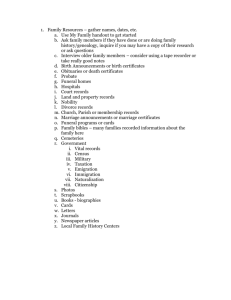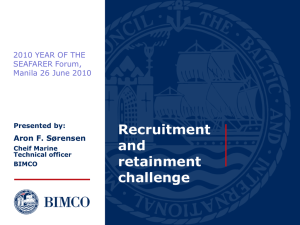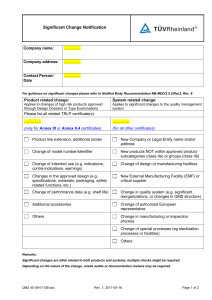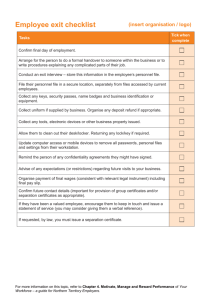Legislative & Technological changes in near future
advertisement
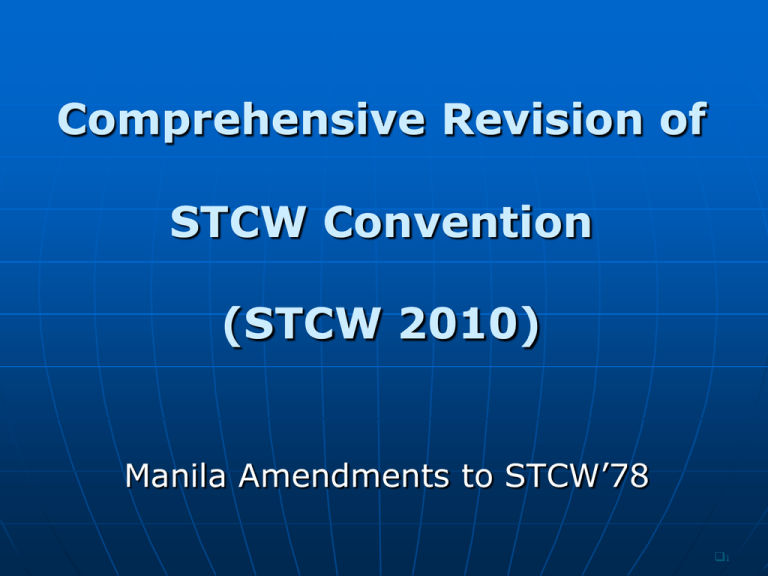
Comprehensive Revision of STCW Convention (STCW 2010) Manila Amendments to STCW’78 1 Presentation Structure Overview of comprehensive revision • Need & Benefits of comprehensive review • Terms of reference • Calendar of Events Salient changes in STCW Convention Action Dates Impact of revision on: • Maritime Administrations • Shipping Companies • Training Institutes • Seafarers 2 Need for Comprehensive revision During STW 37 (Jan. 2006), it was felt that the Convention needs to be amended to include: Security training provisions; Standards of competence for senior ratings; Competence standards for tankers, incl. LNGs Identification of refresher training areas for demonstration of competence in Safety Training Review of Alternative Certification; and Criteria for safe manning & Rest periods 3 Benefits of the Comprehensive review Administrations - Amend laws & Rules relating to training & certification once Saving legislative time & reducing administrative burden; Shipping Companies - Planning training of its crew in a Packaged manner, saving of time and money; and Training institutes - Revise their curriculum once to meet requirements - More time available for training; Seafarers - Additional Training during leave period -Single phase rather than every time they are on leave 4 Terms of Reference – STW 38 (Jan.07) Retain the structure & goals of the 95 revision; Not to down scale existing standards; Not to amend the articles of the Convention; Address inconsistencies ..… Outdated requirements & technological advances; Address requirements for effective communication; Provide for flexibility ….. innovation in technology; Address the special character and circumstances of short sea shipping and the offshore industry; Address security-related issues. 5 Calendar of Events April 2006 – Groundwork began for Revision January 2007 (STW 38) - Revision proposed to Sub-committee and the Terms of Reference approved March 2008 (STW 39) - 52 proposals Sept. 2008 (ISWG 1) - 62 new proposals Feb. 2009 (STW 40) - 68 proposals Sept. 2009 (ISWG 2) - 25 pending & 39 new proposals Jan. 2010 (STW 41) - Final set of 55 proposals June 2010 (Conference) – 31 last minute proposals Salient Changes in STCW’95 Chapter I General Provisions Clarification on Certificates The term Appropriate Certificate – deleted Main Certificates of Masters, Officers and GMDSS Radio Operators = Certificate of Competency Certificates for other Regulations including Ratings and Modular Course Certificates = Certificate of Proficiency (Info prescribed) Other Documents = Documentary Evidence Certificates & Endorsements COCs shall be issued only by Administration after verification of authenticity and validity of any necessary documentary evidence Tanker Endorsements to Officers shall be issued only by administration Recognition Endorsements shall be issued by Flag States for COCs and Tanker Endorsements of Officers only after verification of authenticity and validity – Isseing State to provide by Electronic Means Near Coastal Voyages If near-coastal voyages are performed by ships include coast of other countries – Undertaking with the countries concerned NCV Certificates issued by one country may be accepted by another country for their near-coastal voyages - Undertaking with the countries concerned Incorporate near-coastal limits in COCs Not intended to cover world-wide voyages Compliance & Enforcement Port State Control - Assessment of the ability of seafarers to maintain watchkeeping and security standards – “Compromise to security” in the list National Laws - Enforce appropriate measures to Prevent fraud and unlawful practices for Certificates & Endorsements May allow distance learning or elearning White List & Quality Standards Compliance Document to be sent to IMO for demonstration that full and complete effect has been given to the Convention Review of White List Five yearly independent evaluation to be sent to IMO including further amendments QSS to include procedures for issue of medical certificates Medical Certificates and Standards List of approved Medical Practitioners to be made available Medical Certificates shall be valid for 2 years (1-year for <18 years age) If the Medical Certificate expires during voyage, it shall continue in force till next port where recognized medical practitioner is available, not exceeding 3 months Eye sight Standards revised & Guidance reg. Physical Ability Standards for Medical Examination provided in B-Code Recognition & Revalidation Evaluation of the Recognized country No Endorsement attesting recognition of Certificate without verification of authenticity of Certificates Administrations to provide Electronic verification of authenticity of certificates Revalidation of COC also permitted if sailed for 3 months in last 6 months before revalidation If applied for revalidation upto 6 months in advance, may revalidate upto 5th Anniversary Company Responsibilities & Transitional Provisions Company to ensure: • Seafarers have received refresher and updating training as per the Convention • Effective oral communication on board as per SOLAS Transitional Provisions or Grace period decided in the Diplomatic Conference at Manila Chapter II Nautical Department Operational Level Proposal from Norway to DELETE Celestial Navigation from Competence standards X Paper from USA – Can’t Guarantee GPS – Malfunctioning or failure – Liability and Compensation for incidents Additional Guidance provided in B-Code Blind pilotage techniques in Bridge watchkeeping Use of ship reporting systems and VTS procedures Bridge Resource Management Operational Level Electronic Charts & Display Information System MERSAR to IAMSAR Proposal from Norway to Delete Visual Signalling & Morse Code ? X Reduced to Single letter Proactive measures to protect the marine environment Leadership and Team-working Skills Proposal from Norway to include Integrated Bridge or Navigation Systems ? X Management Level Ship reporting systems and VTS procedures Decca and Loran replaced by Terrestrial Electronic Position Fixing System Electronic Charts & Display Information System – Management of ECDIS MERSAR to IAMSAR IMSBC Code Leadership and Managerial Skills Integrated Bridge or Navigation Systems X Ratings - Able Seafarer (Deck) Watch-keeping Certificate (Navigation) + 18 months service, OR 12 months service and approved training Training Record Book Meet the standards Issue of Certificate Chapter III Engineering Department Operational Level 30 months Education & training replaced by: Combined workshop skill training and onboard training of 12 months, OR 36 months of combined workshop skills training and approved sea going service which should be minimum 30 months in the engine department 6 months Engine Room Watch-keeping service as part of approved seagoing service Education & training and meet the standards of competence Operational Level + Engine Room Resource Management Internal Communication Systems Electrical, Electronic and control systems Automation and Control Systems Proactive measures to protect mar. environment Environmental Awareness, particularly in the use of Oil water separators Leadership and Team-working Skills Overhaul of the entire curriculum - Japan Management Level Sea time requirements for 2nd Engineer and Chief Engineer revised in line with Chief Mates and Masters (12 + 36/24) Electrical, Electronic and control systems - Enhanced Maintenance and Repair – Enhanced Leadership and Managerial Skills Overhaul of the entire curriculum Japan Ratings - Able Seafarer (Engine) Watch-keeping Certificate (Engine Room) 12 months service OR 6 months service and approved training Training Record Book Meet the standards Issue of Certificate New Competency Standards for: Electro Technical Ratings Electro Technical Officers Senior Electro Technical Officers ? X Special training for Engineering Personnel managing and operating Electrical power plants > 1000 V Electro Technical Rating Completed approved sea going service including 12 months training and experience Or Completed approved training including minimum 6 months sea going service Or Meet technical competencies and minimum 3 months sea going service Meet the standards as specified in Code Electro Technical Officer An approved training program of 12 months of combined workshop skills training with minimum 6 months seagoing service or 36 months of combined workshop skills training and approved sea going service which should be minimum 30 months in the engine department Completed approved education and training to meet the standards as specified in Code Highlights of Other Proposals Carriage of Trainees to be mandatory on ships (India) ? X Master should not be counted as Watchkeeper (IFSMA) ? X Ship-in-Campus Concept (India) ? X kW limitations on NCV change to 6000 / 8000 (India, US, Singapore ) ? X Chapter VII Alternative Certification Polyvalent Certification Polyvalent Certification introduced for: Nautical and Engineering Watch Keeping ratings Able Seafarer (Deck) and Able Seafarer (Engine) Integrated training as proposed by EU permitted Chapter IV Radio Communications GMDSS Refresher and updating Training Course for GMDSS ? X On board familiarization with the equipment carried on ship MERSAR to IAMSAR Chapter V Special Ship Types Tanker Endorsements Tanker Fire Fighting included in Tanker Familiarization Course Tanker Fam. (Oil + Chemical) and Tanker Fam. (LPG + LNG) 3-month experience mandatory for each type of tanker endorsement, OR 1-month option with 3 loading and 3 discharging Tanker Endorsements Revalidation of Tanker Endorsement: 3 months service or Refresher and updating training Higher Level Tanker Endorsement for all Watch keeping Officers ? (Persons with immediate responsibility = Persons in a decision making capacity) Special training for: - Guidance Code Special character and circumstances of offshore industry: Off-shore Supply Vessels (OSVs) and Anchor Handling Tugs (AHTs) Masters & officers using Dynamical positioning system (DPS) Ice Navigation and navigation in polar areas Personnel manning commercially operated yachts ? X Chapter VI Safety & Security Training Refresher Training – Basic In areas where training can’t be conducted on board Personal Survival Techniques Fire Prevention & Fire Fighting Personal Safety & Social Responsibilities ? X Elementary First Aid ? X Every five years PSSR Course Enhanced Basic knowledge of: • impact of shipping on the marine environment • Complexity and diversity of marine environment Basic Team-working principles & practice, including conflict resolution Principles of and barriers to effective communication on board Understand reasons for and take necessary action to control fatigue Refresher Training – Advanced In areas where training can’t be conducted on board Proficiency in Survival Craft & Rescue Boats Advanced Fire Fighting Medical First Aid ? X Medical Care? X Every five years Security Ship Security Officer’s Course – STCW Security Training for Designated persons Training Course for designated persons who are assigned security related duties on board ships Security Awareness Course - Mandatory for all shipboard personnel “without” Security related duties Security Related Familiarization - Onboard training to be conducted by Ship Security Officer for all shipboard personnel Chapter VIII Watch-keeping Watch-keeping – Rest Periods Minimum 10 hours of rest every 24 hours May be divided into two parts, one >6 hours (Continuous), provided the interval < 14 hours 2 days in week, rest may be reduced to 6 hours - DELETED The total for the week is 70 [77] hours Exception: 70 hours rest in 7 days period for two weeks, minimum 10 hours daily (next 4 weeks – no reduction) For 2 days in a week – This may be divided in three parts >6 + >1 + >1 Rest Periods & Alchohol Emergency, distress & overriding operational conditions exempted Musters, Drills, - Don’t disturb the rest • Call-outs to be Compensated Records maintained and Inspection - ISM Audits Alchohol limits BAC limit reduced to 0.05% or 0.25 mg/l in the breath Conference Resolutions Resolutions Transitional Provisions and early implementation Verification of Certificates of Competency and endorsements STCW and Ships’ Manning Levels Promotion of technical knowledge, skills and professionalism of seafarers Invites IMO, ILO & WHO to develop guidelines to implement medical fitness standards Invites IMO, Governments & International Organizations to assist in revising Model Courses Resolutions Promotion of technical co-operation Measures to ensure the competency of Masters and officers on ships operating in polar waters Attracting new entrants and retaining seafarers for the maritime profession Accommodation for Trainees on new and existing ships Promotion of the participation of women in the maritime industry Future amendments and review of the STCW Convention and Code Resolutions Contribution of ILO – Recognizing the role, competences and expertise of ILO in Occupational Safety and Health of workers Role of MWU and IMLA Thanks to Philippines Government Year of the Seafarer - 2010 Day of the Seafarer – 25th June Action Dates 12-21 May 2010 - MSC meeting approved amendments 21- 25 June 2010 - International Diplomatic Conference - Manila Adopted the Revision 1st July 2011 - Deemed Acceptance unless objected by 1/3 members OR Members with >50% GT 1st January 2012 - Enters into Force Action Dates 1st Jan 2013 - Compliance document to be submitted to IMO for White List 1st July 2013 - Revised Standards apply to new entrants 1st January 2017 - Transitional Provisions (Grace Period) for Existing Seafarers Ends Maritime Administrations Changes in National Laws and Rules, META Manuals, etc. NCV Certificates undertakings with the other countries Prepare compliance document for white list Independent quality evaluations to submit Procedures for medical fitness certificates Maritime Administrations Electronic verification of All certificates to Flag Administrations and Companies / Employers Compare pre–2010 standards with STCW 2010 and prescribe refresher and updating training or assessment Revise curriculum for courses and examinations Prescribe upgradation and refresher training programmes Maritime Administrations Issue Able Seafarer (Deck) and (Engine) Certificates including backlog (>30000)and polyvalent certificates Electro Technical Rating and Electro Technical Officers Tanker Endorsements for Watch keeping Officers Prescribe special training for OSV / AHT, DPS and Ice navigation Shipping Companies Ensure seafarers are able to communicated orally in an effective manner on board ships Ensure seafarers undertake appropriate refresher and updating training including upgradation training Shipping Companies Ensure Able Seafarer (Deck) and (Engine) certificates Ensure ET Rating and ETO certificates, whenever carried on ships Ensure Tanker endorsement at appropriate level for officers Provide guidance to seafarers Training Institutes Revise curriculum for various Courses Upgrade Courses (PSSR, Tank Fam, Competency Courses, etc.) Prepare and conduct upgradation courses for existing officers Training Institutes Conduct Refresher training for basic and advanced safety courses Introduce training for Able Seafarer (Deck) or (Engine) Introduce training for ET Rating or ET Officer Seafarers Undertake upgradation training for the Level of CoC including PSSR, B/ERM, L&TW, L&M, IAMSAR, IMSBC New or additional items – ECDIS, High Voltage, Security duties Undertake refresher training in basic safety courses Undertake refresher training in advanced safety courses Seafarers Revalidate certificates of competency Obtain Able Seafarer (Deck) or (Engine) Certificates Obtain ET Rating or ET Officer Certificates Obtain Tankers or other ship type endorsements THANK YOU FOR YOUR PATIENCE

